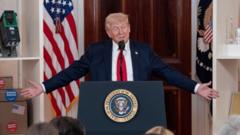The U.S. economy has unexpectedly contracted for the first time since 2020, sparking recession concerns as President Trump urges for more time to stabilize and improve conditions.
Trump Requests More Time Amid First Economic Contraction in Three Years

Trump Requests More Time Amid First Economic Contraction in Three Years
President Trump cites delayed investments and blames former leadership as U.S. GDP faces decline.
In a recent address to business leaders at the White House, President Donald Trump acknowledged the shrinking U.S. economy and requested a "little bit of time" as the nation navigates its first economic contraction in three years. The Commerce Department reported that the U.S. gross domestic product (GDP) decreased at an annual rate of 0.3%, a stark contrast to the previous quarter's 2.4% growth, raising alarms over potential recession.
Trump attributed the weakening economic figures to actions taken before his presidency, particularly blaming his predecessor, President Joe Biden, for the current economic landscape. "This is Biden's economy because we took over on January 20th," Trump stated, arguing that businesses had stockpiled imports in anticipation of the tariffs he imposed, which he claims has skewed the data.
Despite the downturn, Trump emphasized a promise of $8 trillion in inward investments aimed at rejuvenating American manufacturing. He highlighted the participation of notable CEOs, including those from Hyundai and Toyota, as part of his administration's push for innovation in technology, healthcare, and infrastructure.
However, Trump's calls for Congress to support his tax bill, which involves substantial debt relief and spending cuts, face resistance from Democrats and even some Republicans. This adds to the political tension as the administration grapples with economic sentiment, underscored by growing public dissatisfaction, according to recent polling.
On the international front, Trump's aggressive tariff strategy leads to an escalating trade war, particularly with China. With tariffs climbing as high as 145%, the impact reverberates through U.S.-China trade relations, prompting concerns over shortages in key consumer goods. Addressing worries about potential shortages, Trump assured parents that while toy options may diminish, costs would remain manageable.
As Trump marks his first 100 days in office amidst these challenges, the administration's economic recovery efforts will be closely monitored, especially as he navigates growing criticism and strife stemming from both domestic and foreign economic policies.
Trump attributed the weakening economic figures to actions taken before his presidency, particularly blaming his predecessor, President Joe Biden, for the current economic landscape. "This is Biden's economy because we took over on January 20th," Trump stated, arguing that businesses had stockpiled imports in anticipation of the tariffs he imposed, which he claims has skewed the data.
Despite the downturn, Trump emphasized a promise of $8 trillion in inward investments aimed at rejuvenating American manufacturing. He highlighted the participation of notable CEOs, including those from Hyundai and Toyota, as part of his administration's push for innovation in technology, healthcare, and infrastructure.
However, Trump's calls for Congress to support his tax bill, which involves substantial debt relief and spending cuts, face resistance from Democrats and even some Republicans. This adds to the political tension as the administration grapples with economic sentiment, underscored by growing public dissatisfaction, according to recent polling.
On the international front, Trump's aggressive tariff strategy leads to an escalating trade war, particularly with China. With tariffs climbing as high as 145%, the impact reverberates through U.S.-China trade relations, prompting concerns over shortages in key consumer goods. Addressing worries about potential shortages, Trump assured parents that while toy options may diminish, costs would remain manageable.
As Trump marks his first 100 days in office amidst these challenges, the administration's economic recovery efforts will be closely monitored, especially as he navigates growing criticism and strife stemming from both domestic and foreign economic policies.






















